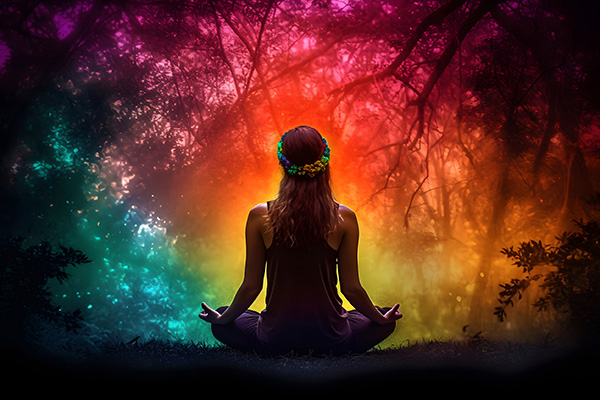intuitive meditation
The Difference Between Emotion And Intuition
 Clients sometimes tell me during psychic readings, “I just have this gut feeling,” or “I don’t know, but something about this seems off.” I love when people say things like this. It means they are noticing the whispers of their inner guidance system. They may not yet have the confidence to fully trust it, but they’ve taken the first step to becoming more aware of whispers of their highers self, asking to be heard.
Clients sometimes tell me during psychic readings, “I just have this gut feeling,” or “I don’t know, but something about this seems off.” I love when people say things like this. It means they are noticing the whispers of their inner guidance system. They may not yet have the confidence to fully trust it, but they’ve taken the first step to becoming more aware of whispers of their highers self, asking to be heard.
The challenge comes when we try to sort out whether that “feeling” we have is an actual intuitive nudge or just an emotion bubbling up from our human experience. From a spiritual perspective, emotions and intuitions are not the same thing. Both are important, but they function very differently.
When you can tell them apart, you can make decisions with greater clarity, avoid unnecessary drama, and walk more confidently along your spiritual path.
Emotions and intuitions may seem similar because they both arise within us without a clear explanation. However, emotions are usually connected to our human reactions. They can be triggered by what’s happening around us, our personal beliefs, or our physical state. As any expert drama queen can confirm, they can sometimes be big, loud, colorful, and full of urgency!
Intuition, on the other hand, is usually quiet, calm, and strangely neutral. Even the most powerful intuitive messages can be completely free of emotion. They carry a simple clarity that doesn’t shout or demand, but simply is. In fact, these emotion-free intuitive hits are often the most accurate and meaningful, because they’re not wrapped up in temporary moods and personal biases.
Manifest Your Best Life While You Learn To Meditate
 Meditation is an ancient, time-tested practice that offers remarkable health benefits that can profoundly impact our overall well-being and happiness.
Meditation is an ancient, time-tested practice that offers remarkable health benefits that can profoundly impact our overall well-being and happiness.
It can also shape our daily reality in powerful ways. A regular meditation practice can improve your ability to manifest your wishes and desires.
Meditation is a conduit for life-altering experiences with seld and spirit. It opens a line of communication with the universe that is both thrilling and comfortingly familiar. It offers wisdom, clarity, and peace, inviting you into a deeper relationship with your own divinity.
Unfortunately, many people struggle to make meditation a daily habit because it challenges modern habits of constant stimulation and relentless productivity. In a society that values busyness, the idea of “sitting still” or “doing nothing” can feel strange or uncomfortable to many.
Another major barrier is the common misconception that meditation requires a completely “cleared mind.” This sets an unrealistic expectation.
When you consider daily distractions, lack of time, and uncertainty about how to begin, it’s easy to see why so many people don’t meditate. However, the beauty of meditation is that it meets you where you are, and no perfection is required.
One of the most enduring myths about meditation is the belief that your success hinges on completely clearing your mind and eliminating all thoughts. In reality, this is just one type of meditation, and it’s a particularly difficult one to master!
Love, Lust, Or Infatuation? How To Tell The Difference
 When you develop intense feelings for someone, it can be hard to tell if you’re experiencing lust, infatuation, or the beginning of genuine, lasting love. All three feelings can be powerful and overwhelming, but they are very different.
When you develop intense feelings for someone, it can be hard to tell if you’re experiencing lust, infatuation, or the beginning of genuine, lasting love. All three feelings can be powerful and overwhelming, but they are very different.
These energies often manifest similarly at first: your heart races, you get butterflies, you can’t eat or sleep, and you find yourself daydreaming constantly. Not to mention the dizzy excitement you feel when you see his name pop up on your phone!
However, love, lust, and infatuation are not the same from a physical, mental, emotional, and spiritual perspective.
Infatuation can hit like lightning. One day, you’re going about your life, and the next, someone catches your eye. Suddenly, you can’t stop thinking about them. It feels exciting — like something big is happening, like fate.
Infatuation is highly emotional, and if left unchecked, it can become an unhealthy obsession with someone. You idealize them and ignore their flaws. Although it can feel a lot like love, it lacks depth and stability.
It’s easy to get caught up in the rush. But that high doesn’t always last. Infatuation can fade as quickly as it began, especially when you start to see the real person behind the sparkly image.
Often, infatuation appears when we’re in a state of desperation. Maybe we’re feeling lonely or want to be loved so badly that we project all our hopes onto someone else. We might think, “This person will complete me,” or “Everything will be better once we’re together.”
